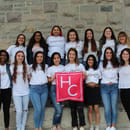TRIGGER WARNING: The following is an account of an anonymous hokie’s experience dealing with sexual assault on campus. The contents of this article are directly quoted from a letter sent to us for publishing. We hope to never deny a victim of sexual assault the platform to speak. With extreme caution, proceed to reading this letter and spreading awareness for sexual violence on college campuses.
—
I’m graduating with my rapist. Virginia Tech has a problem no one wants to talk about.
Almost three years ago, I was asked out by a classmate at the end of the semester to come over and watch the game for a bit, and grab dinner afterwards. Thrilled as a shy new transfer student that someone actually noticed me, and excited to go on my very first date, I immediately accepted. He was charming and charismatic at first, but things quickly escalated when I asked him to stop and slow down.
He didn’t.
And I couldn’t get him off.
As things started to head south, I sent “help me!” text messages to my friends with his address. Tried multiple phone calls. No one answered or even bothered to call back later. I later realized that while I had tried to seek help in vain, those same people had updated their snapchat stories and Instagram accounts instead of replying to me.
So I walked, all the way back to campus. It was sprinkling and I was cold and numb by the time I caught the bus from campus to home. When I finally got home, I went to my closet to kick off my shoes and found myself collapsing on the floor instead, huddled up in the corner, completely silent, too numb to think, to cry, to talk for an hour as his words echoed throughout my head. “You’ll burn in hell for what you did.” “You deserve this.” “No man will ever want or love you again.” His words repeated for hours on end as time and numbness bled into each other, the rest of the night a blank. I woke up on the closet floor the next morning, shrugged off last night’s clothes and got ready for class. I was “Fine.” No one knew a thing.
I never reported my assault, and I don’t regret it, even as I face the real consequence of walking across the stage in the same ceremony as my assaulter. He threatened me physically, professionally, socially, and threatened to sue myself and my family extensively if I dared to file charges or mention him to anyone. His wealth, power, and privilege backed up his threats, as did his history of countersuing other girls who complained against him—a long one of devastating wins.
I never reported it because while I was deciding whether I should report it, I told a close friend and they said that’s what I get for sleeping around with a white man. I never reported it because when I went to Cook Counseling, I was immediately asked to describe everything in detail and to answer invasive questions about my sexual history. I never reported it because I couldn’t even convince myself that it wasn’t my fault after everyone around me told me that I was responsible for my assault. It is an incredibly personal decision for a survivor to choose or not to choose to report it and it should never be one they have to justify to anyone but themselves. And although I entirely encourage everyone to report their trauma, some people, like myself are scared into silence.
He did deliver on his threat of “making everyone know what I am.” A month after the assault, rumors began popping up—that I was a whore, a slut, a bitch, etc. I went from a relatively unknown transfer student to someone who got greeted by people scoffing, rolling their eyes and either muttering “whore” or “hoe” behind my back as I walked away. As it spread more and more out of my control, random men began messaging me on Instagram and Facebook, refusing to tell me who sent them, only saying it was a “dare.” I couldn’t even enter Squires because guys would look at me and burst out laughing, or a particularly brave one would mutter “slut” loud enough for me to hear. I was branded with a scarlet letter when the only thing I was guilty of was being a victim of assault. For the past 3 years, including this one, I couldn’t even walk around at gobblerfest without random guys yelling slurs at me and then ducking into the crowd. Even now, I use the back entrance into Squires when I have to go in, my hands shaking and pulse racing the entire time because I’m terrified someone will recognize me and say something. I don’t know who they are or even have any evidence to report them, aside from a few Instagram usernames. At random parties and bars, random men who know my name that I never met, grab my by my waist or rear, and try to convince me to go home with them- a physical reminder of where my assaulter touched and grabbed me. It’s been two, going on three years that I’ve been assaulted, but I’m still reminded of it weekly.
The reason I share my experiences is not for sympathy, but out of frustration and anger at my school. That a school that’s supposed to be full of “hokie respect” and “ut prosim” is complicit in the acts of others by encouraging them or staying silent. Everyone who spread rumors about me or stayed silent while I was branded a whore is equally as complicit and guilty as the perpetrators. The student body that promotes and promises inclusion and acceptance has harassed me for years across multiple communities and hundreds of students. And I’m not the only one. And my story isn’t the only one out there.
Whether it’s a department that actively employs a racist bigot, people shielding grad students who have penchants for 18 year old freshmen girls, multiple frats and frat brothers who are notorious for being “rapey” , multiple communities harassing a sexual assault victim, all seem to be things people know about , yet refuse to do anything about. To do or say nothing is to be complicit and lays down the groundwork and path for people to keep doing the same things without facing any consequences for generations to come.
Being complicit and silent isn’t just wrong, it’s an act of cowardice. Everyone who knows something is wrong yet refuses to say nothing isn’t a pragmatist to avoid problems, but a coward who refuses use their position and power to speak up and say anything.
In a school where serving others is supposed to be highest, people serve themselves by staying cowards, quiet and complicit in a community of controversy and sexual violence no one wants to talk about. Silence allows these controversies and people fueling them to lay low without any consequences. And our silence sends the message to others, both perpetrators and victims, that racism, sexism, bigotry, and sexual violence are okay and part of everyday campus life.
And under being complicit is trying to appear the opposite in an attempt to clean up their image and create successful PR campaigns to disguise acts of complicity. The same people that have harassed me for 3 years participated in campus campaigns to end sexual assault by taking a picture or signing a little pledge card. And the same guys who harassed me signed an “it’s on us” pledge to end sexual assault during tabling with bystander intervention, despite intervening directly into my life and my trauma weekly. The same department that actively employs a bigot on campus strives to push for diversity initiatives, and the same frats that are “rapey” partner with sororities on women’s issues. So many are willing to create and participate in programming to fulfil the “ut prosim” promise without fulfilling it individually, thinking the programming is enough to ignore individual acts of complicity that add up to larger webs of violence.
But over time, my jaded frustration at my community and school has softened- especially after going to Take Back the Night Last year, thinking no one would show up and walking into an overly packed auditorium of community members who cared. If everyone in that room has the capacity to care, question complicity, and take a stand against acts of violence, I believe our community has the capacity to do so as well. We need to break the cycle of indifference and complicity by taking a stand for others- students serve the entire global community by building houses, infrastructure, and education programs across the world for underdeveloped nations- we should do the same thing at home.
It can be as little as calling out members of your community for perpetrating acts of violence and hate, asking someone who said something racist or sexist why they thought it was appropriate, or taking a stand in a club or department actively hiding a controversial issue. People have to reach out and empathize with each other and take a stand for someone else- if one significant person in the community who harassed me had spoken up, people wouldn’t have felt empowered enough by hatred to call me and message me names outright. Maybe I wouldn’t have to write this anonymously on the year of my graduation and could have talked about it outright.
Complicity is a community problem enacted by the responses of individuals who say nothing or act in hateful ways. Despite the trauma I’ve endured here, I still love my school and sincerely believe we as a community can do so much better. We don’t condone violence as a community, but we cannot condone complicity.
-Anonymous Hokie
National Sexual Assault Hotline: 1-800-656-4673
National Domestic Violence Hotline: 1-800-799-SAFE (7233)
On campus resources:
The Women’s Center, Hours of Operation Monday through Friday, 8:00 a.m. to 5:00 p.m.
For after-hour assistance, please call one of the following: Emergency Assistance, 911 (police) Women’s Resource Center of the New River Valley, (540) 639-1123 Cook Counseling Center, (540) 231-6444 Virginia Tech Police, (540) 231-6411 (non-emergency) Blacksburg Police Department (540) 961-1150 (non-emergency) Schiffert Health Center, (540) 231-6444
*Additional resources include StopAbuse at VT and It’s On Us at Virginia Tech.*


